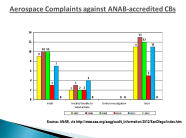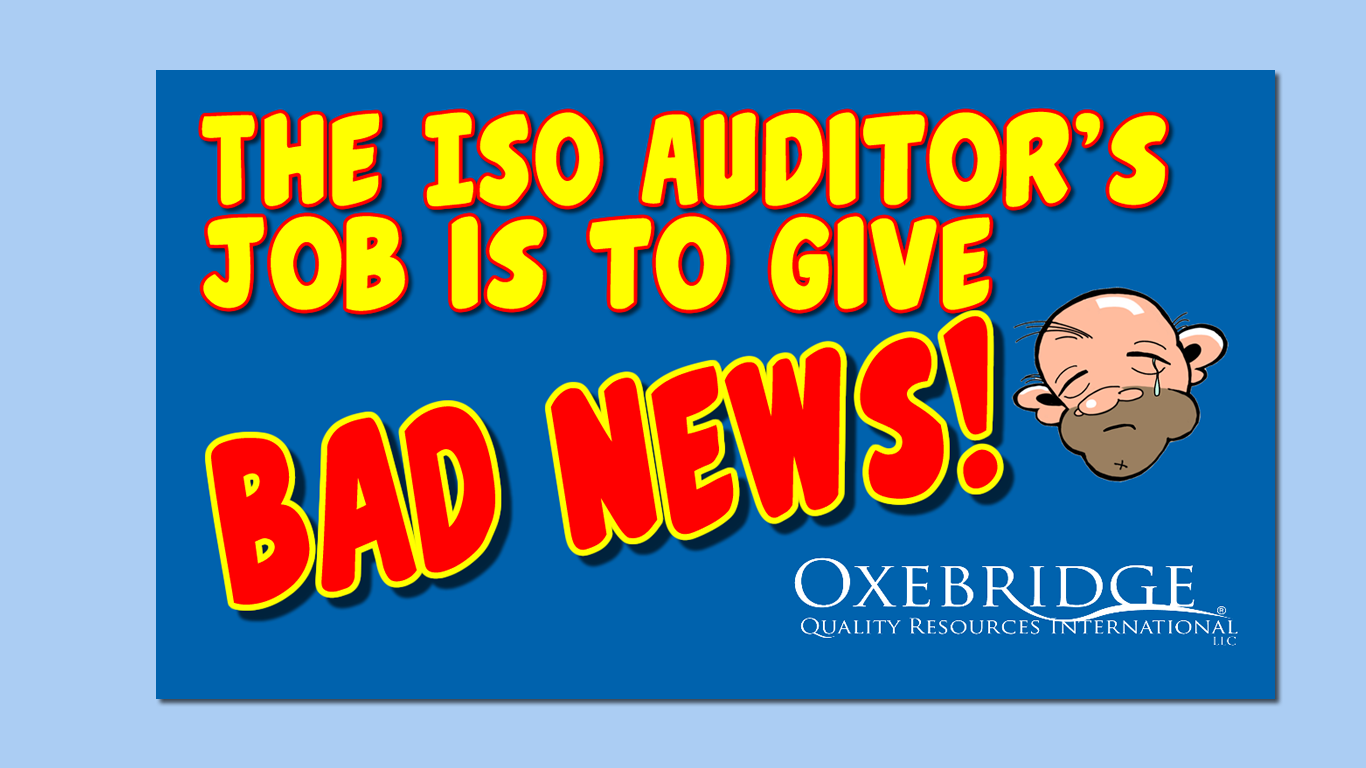 by Christopher Paris
by Christopher Paris
In the first two parts of this series, I showed how certification bodies, training organizations, accreditation bodies, quality publications and even other consultants work in harmony to restrict the open discussion, and thus the continual improvement, of QMS certifications such as ISO 9001 and AS9100. We’ve see real examples of:
- intimidation
- alienation
- roadblocking
- denial
- harassment
- deception
- secrecy
I think it’s safe to say that none of these things is conducive to improving standards or the related certifications associated with them, and all of them are in total contradiction to the governing ISO or related standards, and the marketing hype of the perpetrators.
So what do we do? The following help will focus on filing complaints against registrars, but most of the suggestions would work for any organization, such as trainers, accreditation bodies, and even consultants, without much tweaking.
Get Smart
ISO 9001 registrars are subject to ISO 17021. Buy a copy and read it. If they are doing anything against that standard, it constitutes a valid complaint. That document also lists their requirements for handling complaints, so you can then monitor their responses against the requirements.
AS9100 registrars are also subject to AS9101 and IAQG guideline documents – get them. (The IAQG documents are usually available for free, AS9101 is not, but its’ critically important.)
Accreditation bodies like ANAB are subject to a different standard – ISO 17011. Buy that, too, if things are going to get escalated to that level.
For kicks, buy a copy of ISO 10002, the standard for complaints handling. It makes a good read, and gives you the “true” intent of any complaints handling process, and in some cases is incorporated by reference in other standards.
Finally, read over and understand the particular complaint procedures for your registrar.
Get Gutsy
My biggest battle is against the irrational fear that clients have with their registrars or auditors. Contrary to popular belief, it is almost impossible for an auditor to withdraw an organization’s QMS certification because of a complaint, even if he (or she) gets really, really angry.
The failure on the part of clients to file complaints leads organizations like ANAB to think that everything is okay. In January 2012, ANAB reported to the IAQG that it had received only 11 — eleven! — complaints against CB’sin all of 2011. (Click graphic at right to see ANAB’s figures.)
I want to make this clear: you cannot lose your certification by filing complaints. This is because the structure of audits attempts to ensure that the auditor’s emotions (1) don’t turn into ink on the page, and (2) the auditor does not make the final certification decision anyway… that’s the job of the CB’s review committee. While an “angered auditor” could try to pile on nonconformities, if they are false ones, then they can be reversed when you submit your corrective action responses. (If they are legitimate, then you shouldn’t be fighting against them anyway.)
File the complaint with the CB, and hold your ground. Expect that they will want to convert the matter to a phone call, and resist, insisting that everything be done in writing or email. If you do have phone calls, take notes of everything said, along with names, dates, etc.
If the complaint goes nowhere, escalate to ANAB or the accreditation body. Again, expect pleading calls from your CB to “resolve this like men” (or some other nonsense), but stick to the procedures. Keep records.
In all cases, be sure your complaint is (a) POLITE!!, (b) based on facts, (c) provides evidence, (c) verifiable, (e) cites any requirements which have been violated, and (f) POLITE!! (again).
I can’t emphasize that last part enough. I am known for my snarky tone in my online posts, but when it comes to filing official complaints, I only put evidence and requirements on paper, and this makes the effort less likely to get rejected on style, so everyone can focus on substance.
Stand Firm
It is likely the CB will respond with a watered down, weak reply that fails to provide a root cause or suitable long-term action plan. If so, feel free to ask for these conditions as part of your final approval of the resolution. They may tell you that your approval isn’t even needed (another anti-customer red flag!), but stick to it. Your approval is needed if they want to keep doing business with you.
Don’t accept the response until you feel the problem is not only addressed and resolved for you, but for anyone else who could experience the same problem.
If the complaint does get escalated to ANAB or an accreditation body, also stand firm and request written resolutions. ANAB also likes to try to take things “offline”, or sometimes records a different issue than what was originally reported, so be sure the final record reflects accurately your original claim.
Go Social
Contrary to the cynical declaration by AAQG/Cessna’s William Blake (“attempting to address them here will not drive change!”), or Plexus’ Jim Powell (“please address any further comments about Plexus [through] official channels … rather than making snide and ridiculous commentary from the shadows”) taking your gripes online works. I am not being hyperbolic if I point out that, recently, not a few countries would still be mired in antidemocratic, totalitarian regimes had they listened to Mr. Blake and kept their concerns to “official channels” and not gone online.
The “official channels” are created by the officials, so they have built-in bottlenecks, roadblocks, access limiters and filters. They are designed to suit their creator, not their user. When official channels don’t work, it is important to take the issue to a place where they don’t control access, and can’t limit the reaction.
Ironically, Mr. Blake wouldn’t have a job if Clyde Cessna had listened to the first banker who denied him his loan, rather than moving to another city and pushing ahead with a different lender. Sticking to “official channels” would mean we’d have no US aerospace industry, since there’d be no United States, a country built on the notion of challenging leaders. Imagine if George Washington had Facebook.
Social tools like LinkedIn, Facebook, Twitter and Yelp can get an issue a more immediate response because the subject of the complaint cannot control the spin. That pushes them even harder to at least appear to process a complaint properly, if not just bit the bullet and do so. The power brokers will make a lot of noise saying how ineffective it is, but remember: if the end result of their suggestion would be limiting, then the intent is to limit. And any organization, such as AAQG or SGS or Plexus, that is attempting to limit feedback is basically admitting their distaste for their customers and the concept of continual improvement.
Because the market drives their business, quickly resolving a well-publicized gripe is important.
Only rarely will a customer service rep have a Paul Cristoforo moment and go crazy on a customer in a public forum, and if they do have a meltdown of that size, it only benefit you anyway. (But don’t push them to it!)
We’ve set up Facebook pages for ISO 9001 User Group and AS9100 User Groups which, once they get rolling, stand to be great places to have these conversations.
Oxebridge has been investigating the legal and logistical hurdles in establishing an “Angie’s List” type website for rating registrars and auditors in a formal, verifiable yet “safe” environment for users. We will keep you posted on how that develops, and when it will be available for public use.
Use the Press
While it’s unlikely any of the quality press will publish concerns or issues regarding registrars, it’s a subtle trick to submit information to them regarding problems you encounter. Over time they may write an article on the subject matter in a holistic way, not specific to the CB your are naming, but which nevertheless is helpful.
Consider alternate press sources, too, including mainstream newspapers and publications, places where the readership may be much broader than the limited village of quality professional readers.
In all cases, be careful when griping in public. Be sure to present only facts, or to qualify assumptions, suspicions or non-facts with appropriate descriptors (“alleged”, “possible”, “we believe”, etc.) Review these with your attorney ahead of time if possible, because as history tells us, CBs and their ilk have no problem threatening to sue for libel, slander or any other reason, rather than push ahead on continual improvement.
Notify Everybody
If you have a serious issue — and remember to take an objective look at it, because everyone thinks their issue is a serious one, even if it isn’t — then consider sending copies of your complaint to everyone. For example, if you are in the aerospace world, that means the CB, ANAB, the AAQG, the IAQG, the IAAR and (why not) the Better Business Bureau. (The latter has almost no effect in any practical way, but it still strikes terror in some older marketing guys.)
Fire Them
Everyone can be replaced. Power of the free market, and all that.
Remember the Purpose
Often, when barraged with insults, obstacles, glares and nasty phone calls, I wonder “why the hell am I doing this?” I have to come back to the intent of international standards. We are in this game in order to make things better. Maybe even to save lives, but definitely to improve businesses. An improved business hires people, promotes other people, increases wages, makes people’s lives better, and makes families happy.
Those cynics working to limit criticism are working against those ideals. Remember that. Providing negative feedback is your right, it’s your responsibility, and it can make the world a better place. It can save your organization money, it can ensure everyone works to the same rules, and improve the value and recognition of accredited QMS certifications across the world. We lose our ability to complain about other countries’ “counterfeit certificates” if we don’t ensure the absolute validity of our own.
Every human endeavor ever achieved was the result of someone pushing against an established limit that was accepted as a norm. Your efforts to ensure you get a fair audit may not seem a lot like putting a man on the Moon, but the required thinking is very much the same, and it is an absolute historical reality across all generations and cultures.
And, yes, this may be off topic, but please send a compliment when it’s due.
Christopher Paris is the founder and VP Operations of Oxebridge. He has over 35 years’ experience implementing ISO 9001 and AS9100 systems, and helps establish certification and accreditation bodies with the ISO 17000 series. He is a vocal advocate for the development and use of standards from the point of view of actual users. He is the writer and artist of THE AUDITOR comic strip, and is currently writing the DR. CUBA pulp novel series. Visit www.drcuba.world








